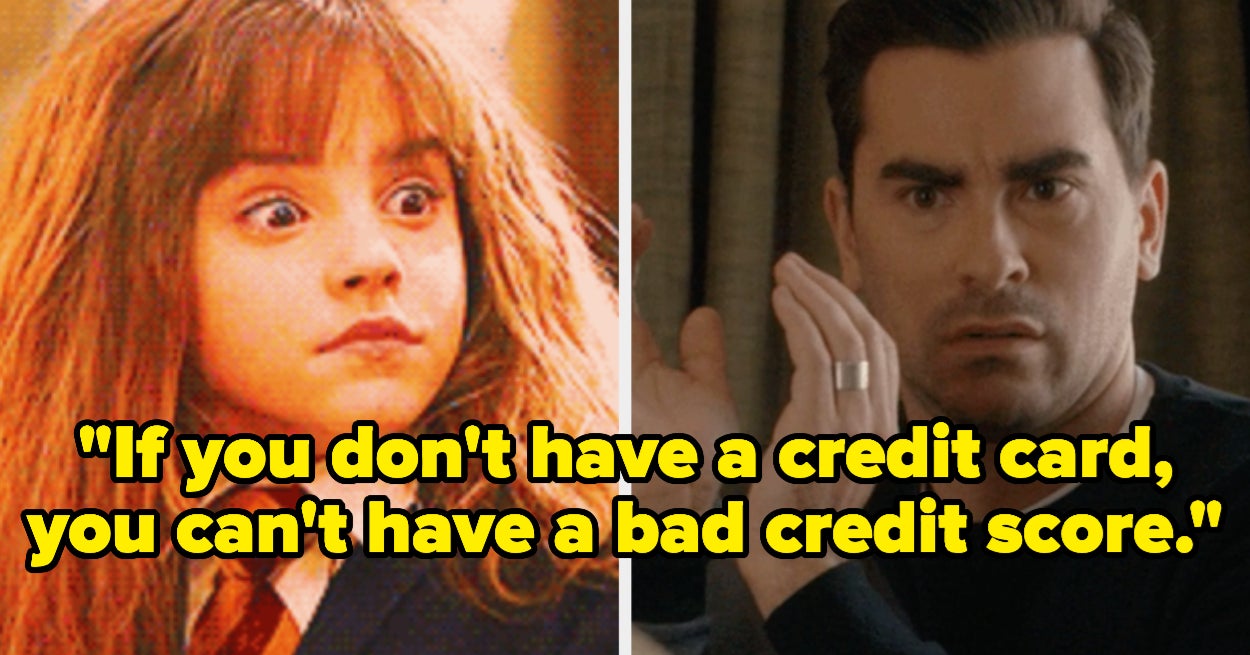[ad_1]
We hope you love the services we recommend! All of them were independently selected by our editors. Just so you know, BuzzFeed may collect a share of sales or other compensation from the links on this page if you decide to shop from them.
Credit scores are misunderstood creatures of the financial world. And while they may seem confusing, believing the wrong things (or ignoring them altogether) can actually do more harm than good.
FOX / Via giphy.com
Your credit score makes it possible for you to get approved for a mortgage, car loan, or other types of credit. And your score can also determine the interest rates you’ll have to pay.
So we rounded up some not-so-helpful pieces of credit score advice to help you get to the bottom of what’s *actually* helping and hurting you:
1.
“You only have one credit score to worry about.”
Hulu / Via giphy.com
You can actually have many different credit scores. This is because credit scores can be calculated using different scoring models, and your scores can also vary depending on which of the three credit bureaus’ reporting was used to determine them. If you’re in the US, the FICO score is used by 90% of lenders when it comes to credit decisions (don’t worry, Experian lets you easily keep track of your FICO score, so you’ll always know where you stand before you apply for a loan or credit card).
2.
“Avoid checking your credit score too often because you’ll lower it.”
CBC Television / Via giphy.com
Checking your own credit score will NOT lower it. However, running a certain type of inquiry into your credit history might. There are two types of credit inquiries: a soft inquiry and a hard inquiry. If you look at your own score, this is a soft inquiry that will not affect your scores. And it’s actually really easy to check your own credit score. Experian allows you to check your credit score for free — which can be a good habit to get into. You can also use the platform to double-check your Experian credit report, which can help you catch identity theft and any credit-reporting mistakes before they can do too much damage.
Hard inquiries, on the other hand, occur when you apply for additional credit and a lender asks to look at your credit file, and this can bump your score down a bit. So let’s say you apply for a credit card from your favorite store, or you apply for a car loan — you’re running an inquiry that can extend you new credit, so that can affect your score. Of course, one hard inquiry every six months or so won’t drastically lower your score, but applying for several new lines of credit at once can make you seem like a risky borrower, and it’ll lower your score.
3.
“You have to be in debt to get a healthy credit score.”
E! / Via giphy.com
Taking out loans and having a little credit card debt can speed up the process of getting to a healthy credit score by bulking up your credit file, but they aren’t always necessary. Plus, the longer you carry a debt balance, the more you’ll accrue in interest charges over the lifetime of the debt. If you have a credit card, for example, making purchases and paying them off in full every month can help you achieve a healthy score over time, without building up debt or interest charges.
4.
“It doesn’t matter how much you charge to your credit card, as long as you make a monthly payment.”
ABC / Via giphy.com
Actually, your credit score isn’t just about making on-time payments.
Your credit utilization — aka the amount of credit you’ve used compared to the amount of credit you have available — is actually the second-largest component to calculating a credit score. And you can approximate it yourself by dividing your total balance by your total credit limit.
Stay with me here, because we’re about to do a little math. Let’s say you have two credit cards that each have a $1,000 limit. One of them has a $500 balance on it, and you’ve paid off the other one, so it has a $0 balance. To find your utilization, you’d just do $500 divided by $2,000 (your total credit limit). This works out to be a 25% utilization. OK, cool! So let’s say you close the card you paid off. Now your utilization is $500 divided by $1,000, which is a 50% utilization. That’s a huge difference just from closing one card! This jump can lower your score even though you didn’t change anything else.
For a credit score in the “good” range, it’s generally recommended to keep your credit utilization under 30%. And for the “exceptional” range, you’ll want to shoot for 10% or lower.
5.
“Closing a credit card you haven’t been using won’t have an impact on your credit score.”
Netflix / Via tenor.com
We *just* worked through this scenario, and as you saw, closing a credit card (even though you paid it off) can have a huge impact on your score. You should actually be careful about purposely closing a credit card. Part of the reason has to do with credit utilization. By closing a credit card, you lower your total available credit — which increases your credit utilization. Plus, closing a credit card can affect your average age of credit (which is also a factor in determining your credit score!!!), so it’s best to keep your oldest cards open.
Sometimes, however, a card gets closed when it hasn’t been used for a long period of time. So what can you do? Just use it to make a (small) purchase once or twice a year to keep the card active.
Of course, there may be some instances when it might make sense for you to close a credit card — like if you feel like your spending is out of control or your card has a hefty annual fee you can’t afford anymore — but be aware that it could negatively impact your score.
6.
“If you don’t have a credit card, you can’t have a low credit score.”
NBC / Via giphy.com
Credit card activity can be a good clue into how well you manage credit. Your payment and borrowing activity get calculated into your credit score, so if you don’t have any good credit activity to show, the credit scoring models won’t have much to go off. Lenders rely on these clues when it comes to approving you for a loan (like a mortgage) and determining what interest rate to charge you. In fact, if you don’t have a credit score, you might be seen as a risky borrower. If that’s the case for you, don’t fret: This could be because there just isn’t enough info in your credit history to devise a score for you.
Many people try to avoid opening up and using credit cards because of a fear of overspending. But avoiding credit cards altogether won’t necessarily give you excellent credit. Using them responsibly can actually help you build good credit. To start, you could consider opening a secured credit card. This works similarly to a regular credit card, except it requires a security deposit to cover any potential missed payments.
7.
“Having large amounts of debt means you definitely have a low credit score.”
NBC / Via giphy.com
This isn’t necessarily true. Mostly, it’s relative to your credit limit and credit utilization. Owing $400 when you have a $500 credit limit seems like a lot of debt. But owing $8,000 when you have a $20,000 limit may not be seen as a lot of debt because of the higher limit. Therefore, it won’t impact your score as much.
8.
“A low credit score lasts forever, so there’s nothing you can do about it.”
Brownstone Productions / Via img-s1.onedio.com
It can be really easy to think of a low credit score as a permanent letter “F” on your report card that you can never remove. However, over time, building better habits can help you improve a low score. This means making on-time payments, keeping your cards active for a longer period of time, and watching your credit utilization.
9.
“It’s OK to have an authorized credit card user because their activity won’t affect your credit score.”
CBS / Wolf Entertainment / Via giphy.com
An authorized credit user is a person who you’ve added to your credit card account to help them build credit. Your credit card’s payment history, age, and credit utilization get added to their credit report. An authorized user won’t show up on your credit report — but their activity can still help or hurt your score. If they are constantly running up your balance, you might see your score knocked down a few points if your credit utilization gets to be on the higher side.
On the other hand, when it comes to getting approved for a loan or other hard inquiry, being an authorized user may or may not help your score. Really, it depends on the credit score model that the lender is looking at. Some models calculate a score with authorized user activity in mind; others don’t.
10.
“Missing just one debt payment is no big deal.”
Warner Bros. / Via giphy.com
Making on-time payments = extremely important. Every scoring model uses different factors to calculate credit scores, but generally speaking payment history is the most important one. Lenders will want to make sure that you can make payments on time. So sorry to be the bearer of bad news, but even one missed payment can lower your credit score.
Mark your calendar, set a reminder on your phone, leave sticky notes around the house, or set up automatic payments. Do whatever works to help you never miss a payment.
11.
“Making on-time payments is the only way to improve your credit score.”
Red Granite Pictures / Via giphy.com
While again, these can vary depending on the scoring model, the most commonly examined factors include credit history length, credit mix, and new credit.
Your credit history length is the amount of time you’ve had credit accounts. It can actually go as far back as your very first credit card!
Credit mix refers to how diverse your lines of credit are. A diverse credit mix could mean having a credit card, a student loan, a mortgage, and a car loan. These lines of credit can help a lender decide how well you manage each type of debt.
Lastly, new credit encompasses any new credit accounts you recently opened and any hard inquiries that have been made. Although it usually only makes up a small percentage of your score, opening up too many new credit accounts in a short period of time can be viewed as a sign of riskiness.
So making on-time payments isn’t the only thing that matters when it comes to calculating your credit score. Having a mix of positive credit habits can really ~pay off~.
12.
“Paying off all your debt will increase your credit score.”
BET+ / Via tenor.com
The short answer: It depends on the type of debt you pay off. Paying off credit card debt can help raise your credit score. However, paying off installment debt — debt that must be repaid in full over a specified amount of time — doesn’t improve your credit score. One super-common example of installment debt = a car loan. Paying off an installment loan causes that loan to no longer appear as active on your credit report, so you lose any positive payment history associated with it, which may cause your scores to dip. But you should keep in mind that this isn’t the same as a negative mark on your credit report; it’s just a change in what’s active. Paying off a loan early can help you save on interest charges, but keeping it open can help you maintain a diverse mix of credit, so the right choice for you really depends on your financial priorities.
If you are looking for ways to increase your credit score, Experian Boost could give your FICO 8 score a quick, painless bump to get you on your way into a higher range. It works by letting you add on-time payments for bills like your utilities, phone bills, and even subscriptions like Netflix to your Experian credit report, which could potentially have a positive impact on your score (if you’ve been making payments on time!). It is ~free~, and you might notice an instant score increase — take it from a BuzzFeeder who actually tried Experian and increased her score.
13.
“You need a perfect credit score.”
NBC / Via giphy.com
The most important thing is that your score is ~healthy~. While achieving an 850 score sounds like peak adulting, it’s more than enough to just be in a “good” score range.
If this sounds like music to your ears (and wallet), don’t forget to check out some of our other personal finance posts.
[ad_2]
Source link










